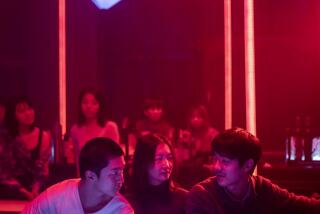A ‘Palace’ in revolt
- Share via
As politically provocative as it is sexually candid, the ambitious and assured “Summer Palace” is just the kind of film calculated to give the Chinese government fits. And it did.
An intense romantic epic covering two continents and more than a dozen years of recent Chinese history, including the shootings at Tiananmen Square, “Summer Palace” was spirited out of the country in 2006 for a slot at the Cannes Film Festival. The Cannes jury inexplicably passed it by and director Lou Ye paid a heavy price for his passion: the national bureaucracy banned him from filmmaking for five years.
Yet though it’s being advertised as “The Film That The Chinese Government Never Wanted the World to See,” “Summer Palace” is much more than that. It’s the swirling story of love in a time of revolutionary upheaval, a film where personal chaos mirrors the political to mesmerizing and unsettling effect. It’s the story of the Tiananmen Square generation that treats the restlessness of youth not as an indulgent cliche but as something painfully real.
Central to “Summer Palace’s” impact is the work of actress Lei Hao as the protagonist Yu Hong. Director Lou’s previous features (the little-seen “Suzhou River” and “Purple Butterfly”) also feature enigmatic, troubled heroines, but he’s never before had as gifted and deeply emotional an actress to work with.
Using intimate wide-screen cinematography (Qing Hua is the director of photography) that follows the actress like a second skin, “Summer Palace’s” lush camera work makes it seem like we are eavesdropping on people living their lives, not characters in a film, a situation the director emphasizes in this two-hour-and-20-minute film by allowing scenes to play out unhurried.
This intimacy is especially visible in the film’s erotic sex scenes, which make it the first mainland Chinese feature to show both male and female frontal nudity. A headstrong beauty, conflicted and disdainful, Yu Hong is the kind of character other people talk about, both with envy and despair.
It is 1987 when we meet Yu Hong, a young woman from a small town near the North Korean border who is about to live one of her big dreams: She’s been accepted to study at prestigious Beijing University in China’s capital. There she makes friends with the vivacious Li Ti (Ling Hu), whose boyfriend studies in East Germany, and through her meets Zhou Wei (Xiaodong Guo), a handsome, sensitive older student who, as an evocative bar scene set to a version of “Can’t Take My Eyes Off You” shows, is as attracted to her as she is to him.
This is not, however, going to be a happy relationship. Yu Hong gets more conflicted about this relationship the more she is drawn to Zhou Wei. It’s as if the intensity of her passion unnerves her and leads to actions -- on both their parts -- that create painful, tormented situations.
In the middle of this comes the Tiananmen Square confrontation, which seems to start as a lark but ends with soldiers shooting at students and leaving all the characters with such a profound sense of dislocation that, in the film’s final hour, it sends them across China and the world, searching for an equilibrium they may never regain. Dealing with the death of dreams they almost didn’t know they had, these characters struggle to escape the curse of the times their loves were born in.
For director Lou Ye, who also co-wrote the script and was a student in Beijing during that crucial year, “Summer Palace” is the story of his particular lost generation, a story he felt so deeply about he risked his career to tell it. Search out this vivid film in a theater. Don’t let the sacrifices he made be in vain.
--
--
“Summer Palace.” MPAA rating: Unrated. Running time: 2 hours, 20 minutes. In limited release.
More to Read
Only good movies
Get the Indie Focus newsletter, Mark Olsen's weekly guide to the world of cinema.
You may occasionally receive promotional content from the Los Angeles Times.









